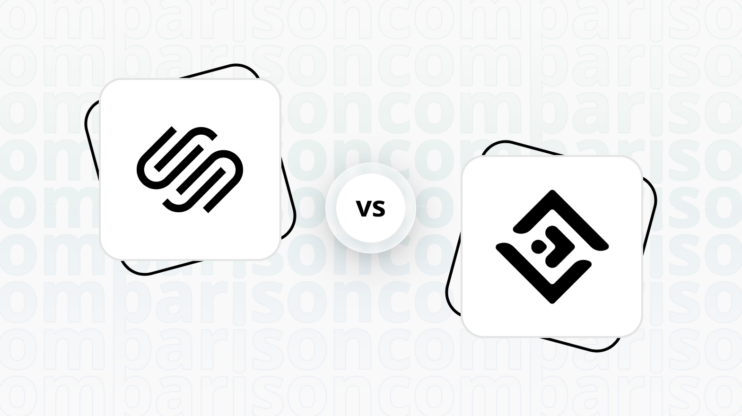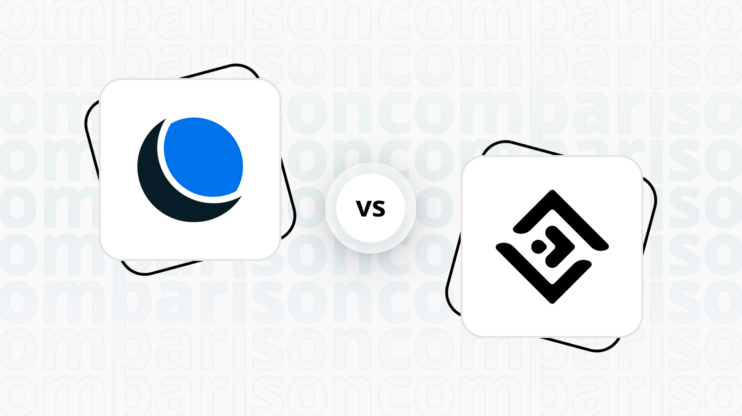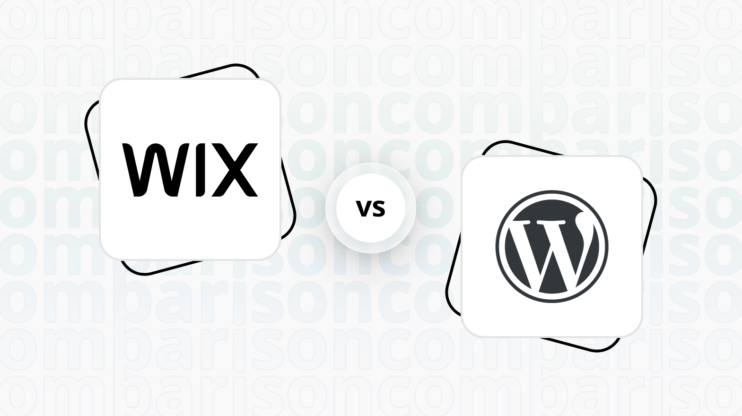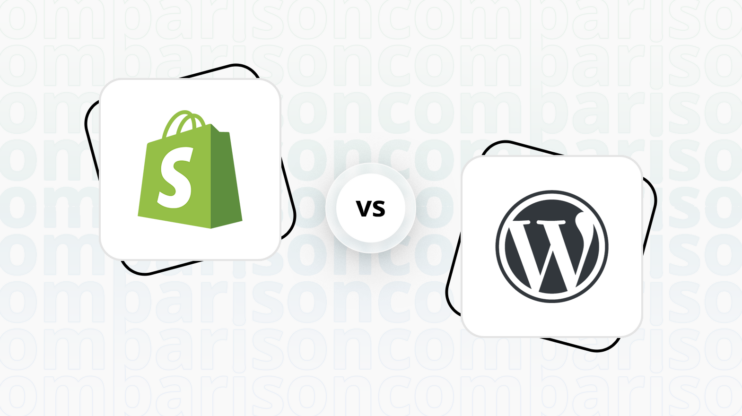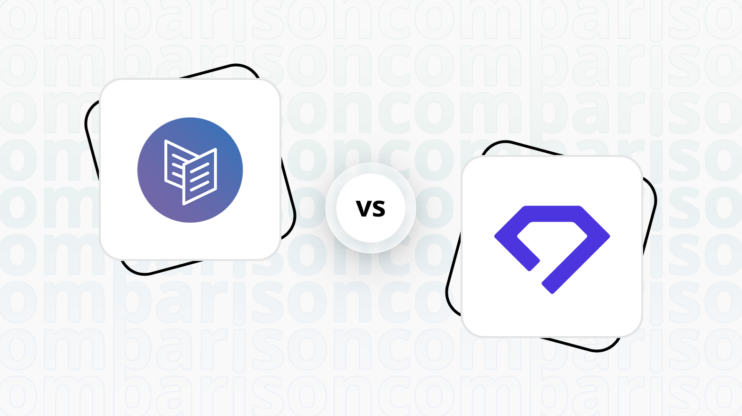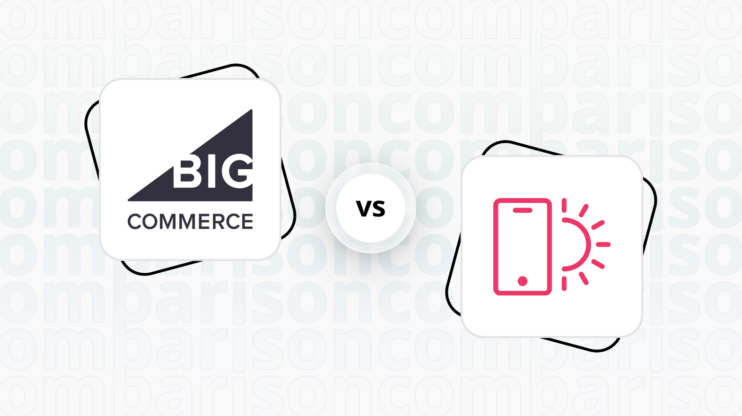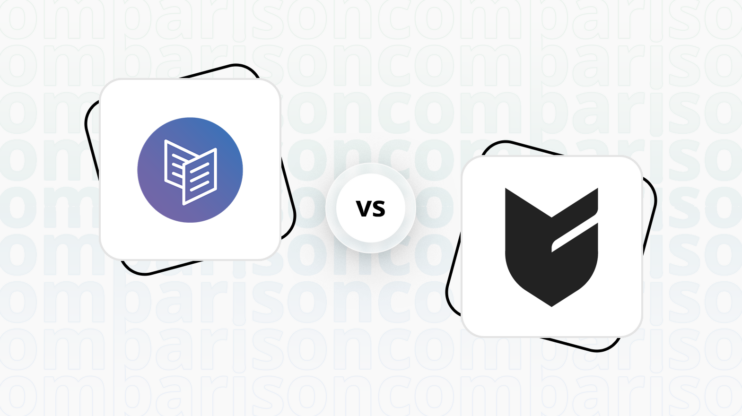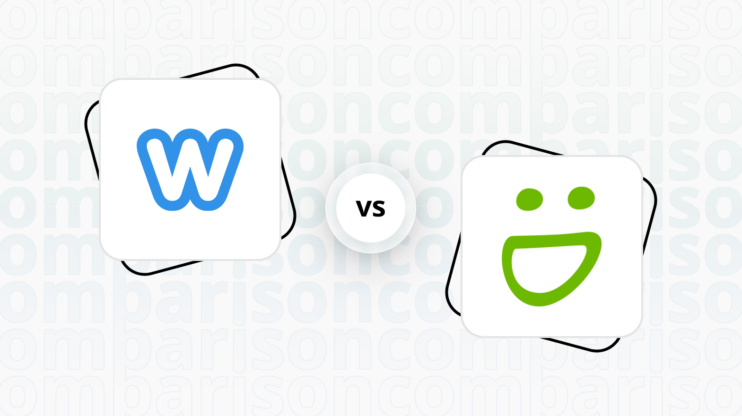Final verdict
Squarespace and Dreamhost offer distinct advantages, catering to different user needs and preferences.
-
Squarespace (Overall Grade: 7.9/10)
excels with its user-friendly interface, high-quality templates, and comprehensive suite of features for website building and ecommerce. It’s particularly suited for users seeking an all-in-one platform that combines ease of use with powerful design capabilities and robust ecommerce tools. Squarespace’s emphasis on design, marketing tools, and customer support makes it a strong choice for small to medium-sized businesses and creatives looking for a visually appealing online presence. -
Dreamhost (Overall Grade: 6.7/10)
, while scoring lower overall, shines in its hosting quality, flexibility with WordPress, and extensive range of plugins and integrations. It’s a solid option for users who prioritize hosting reliability, WordPress integration, and the ability to customize their site with a wide array of plugins. Dreamhost’s strengths in hosting and user management make it suitable for those with a bit more technical expertise or those looking for a platform that can scale with their growth.

|

|
|
|---|---|---|
|
Design functionalities & templates |
8.0 |
7.6 |
|
Ease of use |
8.3 |
8.2 |
|
Ecommerce |
8.2 |
7.4 |
|
Website Editors |
8.3 |
7.3 |
|
Product testing options |
7.4 |
2.7 |
|
Price |
8.4 |
7.8 |
|
Hosting quality |
7.6 |
7.2 |
|
Website speed optimization |
6.7 |
3.5 |
|
Plugins and integrations |
6.8 |
8.8 |
|
Marketing features |
8.1 |
8.0 |
|
Customer support |
7.8 |
7.5 |
|
Security |
8.8 |
8.2 |
|
AI capabilities |
7.5 |
1.2 |
|
User Management |
7.4 |
8.8 |
| Overall |
7.9 |
6.7 |
Best for ecommerce
 8.2
8.2
 7.4
7.4
Verdict
: Squarespace shines for those prioritizing design and ease of use in their ecommerce journey, while Dreamhost offers more flexibility for those comfortable with WordPress and seeking deeper customization.
-
Squarespace
: With a score of 8.2, Squarespace is celebrated for its sleek templates and user-friendly interface, making it a go-to for creators looking to blend ecommerce functionality with aesthetic appeal. Its all-in-one platform simplifies the process of setting up and managing an online store, offering built-in marketing tools and comprehensive payment processing options. -
Dreamhost
: Scoring 7.4, Dreamhost caters to users who prefer the flexibility of WordPress for their ecommerce projects. It stands out with its WooCommerce-ready features and a variety of payment gateways, appealing to those who need a more customizable solution and are willing to navigate a slightly steeper learning curve.
Best for informational & business websites
 8.4
8.4
 7.5
7.5
Verdict
: Squarespace is the superior choice for informational and business websites, offering a blend of ease of use, beautiful design templates, and robust security features.
-
Squarespace
: With a score of 8.4, Squarespace shines for informational and business websites. Its user-friendly platform, coupled with a wide array of professionally designed templates, makes it ideal for creating visually appealing sites. Squarespace’s comprehensive security measures further ensure that business websites are not only beautiful but also secure. -
Dreamhost
: Scoring 7.5, Dreamhost remains a strong contender, especially for those who prioritize web hosting reliability and customer support. While it offers a comprehensive website builder, it falls slightly short in design flexibility compared to Squarespace, making it a better fit for users with more technical expertise or those requiring advanced hosting solutions.
Detailed comparison
Design functionalities & templates
Design FunctionalitiesRepresents how well each platform allows for creative design and customization of websites.Score Components:
- Template Variety (30%): Range and quality of design templates.
- Customization (30%): Flexibility and options for design alterations.
- User Interface (20%): Ease and intuitiveness of the design process.
- Responsiveness (10%): Adaptability to different devices and screen sizes.
- Innovation (10%): Unique design features and tools.
 8.0
8.0
 7.6
7.6
🏆
Winner: Squarespace.
If you’re looking for a platform that offers a wide variety of templates and design, Squarespace is the preferred choice.
Squarespace boasts an impressive variety of website templates, offering over 120 pre-designed options to choose from. These templates cater to a wide range of needs and industries, from creative portfolios and sleek online stores to professional business websites and personal blogs.


On the other hand, Dreamhost’s website builder, offers a user-friendly interface that allows for a high degree of customization flexibility. Users can edit various elements including text, images, backgrounds, and layout structures to match their preferences. The platform also provides a wide range of themes and templates that can be further customized to ensure the final website aligns with the user’s brand identity.


Get a head start on website creation with AI
Create a custom website tailored to your business needs 10X faster with 10Web AI Website Builder!
Ease of use
Ease of useReflects the platform’s overall user-friendliness.Score
Components:
- Learning curve (40%): Quickness and ease of getting started.
- Interface design (30%): Simplicity and intuitiveness of layout.
- User guidance (20%): Quality of tutorials and support.
- Flexibility (10%): Adaptability to various user skills.
 8.3
8.3
 8.2
8.2
🏆 Winner: Squarespace
. Scoring a slightly higher 8.3, Squarespace edges out Dreamhost in terms of ease of use. Both platforms offer user-friendly interfaces and drag-and-drop editors, but Squarespace’s larger community of users and high-quality learning resources give it the edge.
Learning Resources
🏆 Winner: Squarespace
. Both platforms offer extensive learning resources, but Squarespace’s high-quality and varied learning experience, including a comprehensive Help Center, clear video tutorials, live webinars, an informative blog, and an active community forum, make it the winner in this category.
For ecommerce
EcommerceMeasures the platform’s effectiveness in supporting online business activities.Score Components:
- Ecommerce themes and templates (20%): Variety and design of templates.
- Product management (25%): Ease of managing and organizing products.
- Payment options (25%): Variety and convenience of payment methods.
- Ecommerce features (20%): Features for managing an ecommerce store.
- Integration (10%): Compatibility with external e-commerce tools and services.
 8.2
8.2
 7.4
7.4
Squarespace and Dreamhost both offer robust ecommerce solutions, but they cater to different needs. Squarespace is a user-friendly platform that simplifies online store setup with an intuitive interface and customizable templates. It handles secure payment processing, flexible shipping options, and automated tax calculations, while also providing built-in marketing tools, SEO optimization, and detailed analytics for enhanced store visibility and performance. On the other hand, Dreamhost offers a versatile platform for building ecommerce sites, with over 200 themes, drag-and-drop customization, and WooCommerce-ready features for online stores. However, it has limited customer support, which could be a concern for users needing immediate help.

|

|
|
|---|---|---|
|
Ecommerce themes and templates |
7.5 |
7.0 |
|
Product page customization |
7.0 |
7.8 |
|
Payment processing and commissions |
7.8 |
7.5 |
|
POS capabilities |
6.5 |
7.0 |
|
Payment gateways |
7.5 |
7.7 |
|
Product numbers |
6.8 |
6.5 |
|
Additional ecommerce features |
7.2 |
7.2 |
Squarespace ecommerce features:
- Intuitive interface
- Secure payment processing
- Built-in marketing tools
- SEO optimization
- Website analytics
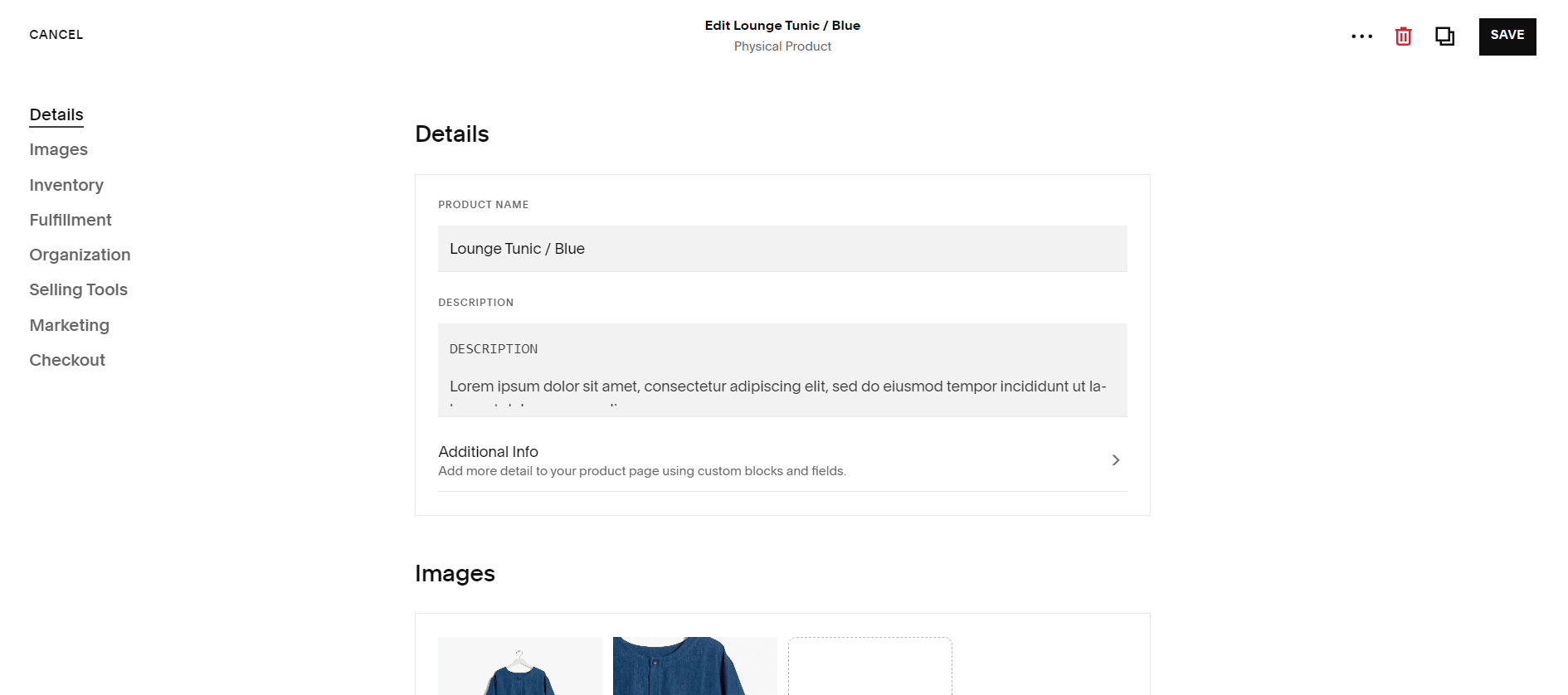
Dreamhost ecommerce features:
- WooCommerce-Ready Themes
- Magento integration
- Shopify integration
Ecommerce themes & templates
Squarespace provides a diverse selection of around 50 ecommerce templates, catering to various industries like fashion, beauty, home goods, and technology. These templates range from clean and minimalist to bold and colorful, accommodating different brand aesthetics and product types. Offering unique layout elements such as product sliders and featured collections, these templates enhance visual interest and engagement. DreamHost facilitates eCommerce site creation mainly through WooCommerce, offering a powerful, open-source platform with plans designed to cater to varying levels of eCommerce activity. Additionally, DreamHost’s WP Website Builder, equipped with BoldGrid, provides a range of mobile-friendly themes for easy site customization without coding knowledge.
Product page customization
Customizing Squarespace product pages offers options for layout, design, and interactive elements. Choose templates, customize colors, fonts, and content. Enhance engagement with features like customizable buttons, wishlists, comparisons, reviews, and related products. Advanced options include custom code injection and third-party app integrations. Limitations include fixed core page structure and the need for technical expertise. Free templates have fewer customization options than premium ones. Through the integration of WooCommerce, DreamHost’s website builder offers a range of customization possibilities for e-commerce product pages to enhance the shopping experience. These possibilities include layout adjustments like modifying the single product page layout and adding custom tabs, introducing custom fields and sections for additional product information and FAQs, implementing dynamic content like personalized recommendations, and enabling product variations with swatches and custom product builders.
Payment processing
Squarespace provides flexible payment processing for online stores with integrated gateways like Stripe and PayPal. External gateways can be set up for specific needs. Transaction fees may apply depending on the plan and payment method. Security measures include PCI compliance and fraud prevention. Additional features include payment links, support for subscriptions, and the ability to accept international payments in various currencies. DreamHost supports a variety of popular payment gateways like PayPal, Stripe, Authorize.Net, Amazon Pay, and Square, each with its own fee structure but no additional charges from DreamHost. These gateways offer features like POS capabilities, fraud detection, and international currency support, making DreamHost a versatile choice for website builders focusing on WordPress integration.
Website Editors
Website EditorsEvaluates the platforms’ website building and editing capabilities.Score Components:
- Customization tools (40%): Range and power of editing features.
- Editor usability (30%): User experience within the editor.
- Design flexibility (20%): Freedom in layout and design changes.
- Update and maintenance ease (10%): Simplicity of updating and maintaining the site.
 8.3
8.3
 7.3
7.3
🏆
Winner: Squarespace
. Squarespace, with a score of 8.3, offers a user-friendly editor that allows easy drag-and-drop website creation without coding. With visually appealing templates and customization options, it caters to beginners and pros alike. The real-time editing experience ensures instant previews. Prioritizing content, it’s mobile-responsive and offers functional features like forms, social media integration, and online stores. Squarespace seamlessly integrates with tools for extended capabilities.
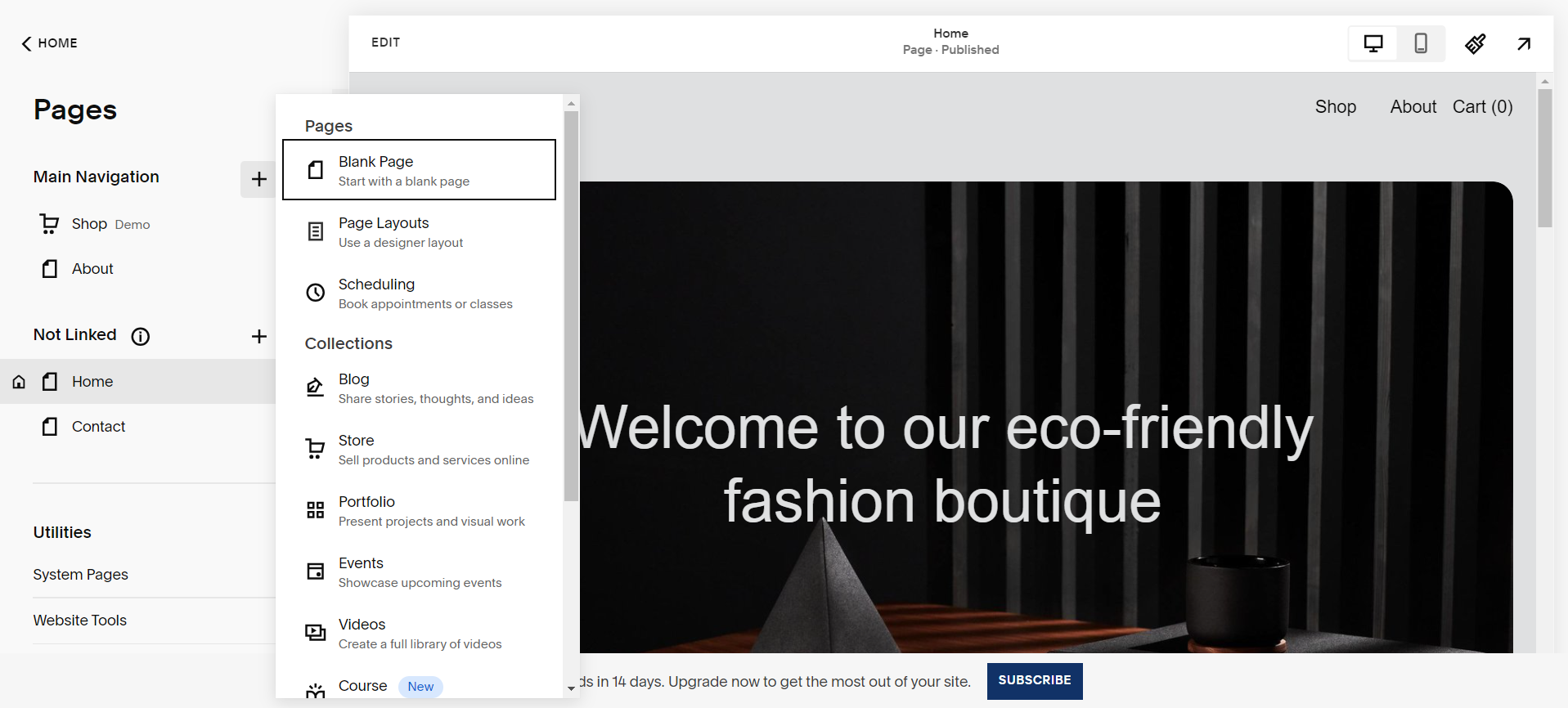
Dreamhost’s editor, scoring 7.3, provides a user-friendly interface for creating and customizing WordPress websites, employing a drag-and-drop editor that eliminates the need for coding skills. It offers a selection of mobile-friendly themes to accommodate various website needs, along with essential tools like backups to safeguard user data. The builder streamlines the website creation process, from theme selection and layout customization to the final installation, enabling users to easily adjust their site’s appearance and functionality.
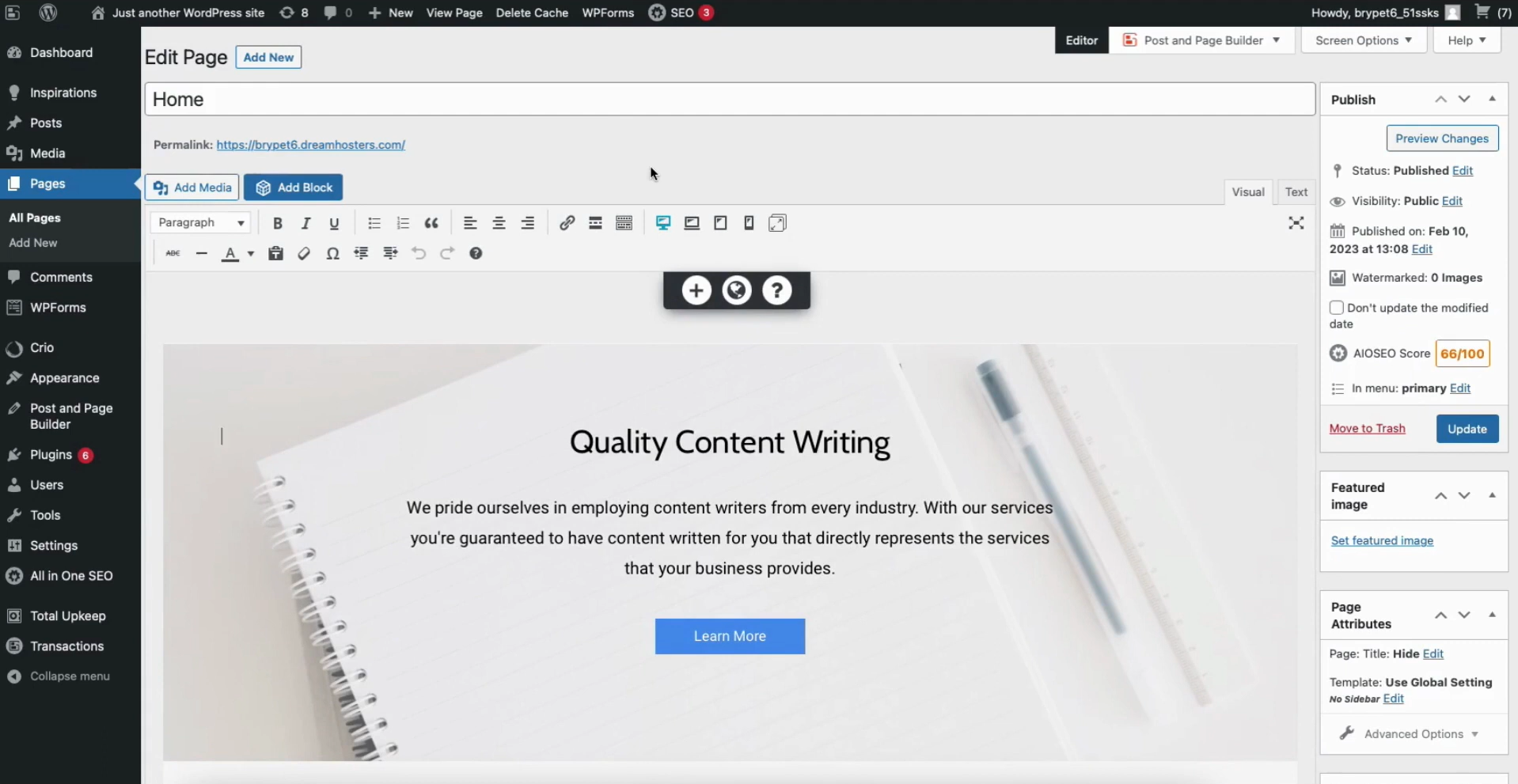
Mobile editor/app
 8.5
8.5
 5.5
5.5

🏆
Winner: Squarespace
. Squarespace and Dreamhost both offer mobile editing capabilities, but they differ significantly in their approach and functionality. Squarespace has a dedicated mobile app that allows users to manage their website, edit content, view analytics, manage their online store, and schedule social media posts. However, it does not offer the full range of functionalities available on the desktop version.
On the other hand, Dreamhost does not have a dedicated mobile app. Users can modify their website using a mobile browser, but this comes with certain restrictions. Given these factors, Squarespace has a clear advantage in terms of mobile editing capabilities, making it the winner in this category.
Product testing options
Product Testing OptionsAssesses the options for trying out platform features before commitment.Score Components:
- Trial quality (40%): Extent and usefulness of the trial or free version.
- Feature accessibility (30%): How many features are available to test.
- Trial duration (20%): Length of the trial period.
- Ease of transition (10%): Smoothness of moving from trial to paid plans.
 7.4
7.4
 2.7
2.7
Overall Result
:
Squarespace Wins
. Squarespace scores 7.4, offering a 14-day free trial and the possibility to test most of the premium features. Dreamhost, scoring 2.7, does not offer a free trial, but allows testing of premium features during the 30-day refundable period.

|

|
|
|---|---|---|
|
Free Plan |
No | No |
|
Trial Duration |
14 days | No trial |
|
Testing Premium Features |
Most of the premium features | During the 30-day refundable period |
Price
PriceLooks at the cost-effectiveness and value for money of each platform.Score Components:
- Plan value (40%): What each pricing tier offers.
- Transparency and clarity (30%): Clearness of pricing structures.
- Flexibility of plans (20%): Range of options to suit different budgets.
- Hidden costs (10%): Additional expenses not included in the plan.
 8.4
8.4
 7.8
7.8
Squarespace and Dreamhost offer a variety of plans to cater to different needs, with Squarespace focusing more on website building and Dreamhost offering more robust hosting solutions.

|

|
|
|---|---|---|
|
$5-$13 |
Personal ($12/month): Build a basic website with limited features for personal use. Access to basic templates, mobile-friendly design, and some social media integrations. Value for price: 6.0 |
Shared Starter ($7.99/month): Shared Hosting with unmetered bandwidth but low SSD storage, Free SSL certificate, automated daily backups. This plan allows to manage only 1 website and there is no limitation of number of pages offered. Value for price: 6.5 |
|
$13-$20 |
Business ($16/month): Upgrade features with custom domain, SEO tools, marketing tools like email campaigns, and analytics. Value for price: 7.5 |
Shared Unlimited ($13.99/month): Shared Hosting with unlimited websites, unmetered bandwidth, but low SSD storage, pre-installed Free SSL certificate, automated daily backups. Value for price: 7.5 |
|
$20-$30 |
Commerce ($26/month): Perfect for online stores with built-in eCommerce functionality (unlimited products), secure checkout, inventory management, and marketing tools. Value for price: 8.5 |
DreamPress ($23.99/month): Isolated Cloud hosting with unmetered bandwidth, 30GB SSD storage, staging website, fast NGINX pre-installed Free SSL certificate, Free WordPress migrations, automated daily backups and on-demand 1-click restore, specialized WordPress support. This plan allows to manage only 1 website and there is no limitation of number of pages offered. Value for price: 8.0 |
|
$30-$50 |
Advanced Commerce ($40/month): Cater to high-volume stores with advanced eCommerce features like abandoned cart recovery, product subscriptions, gift cards, and real-time shipping quotes. Value for price: 9.0 |
DreamPress Plus ($34.99/month): Isolated Cloud hosting with unmetered bandwidth, 60GB SSD storage, staging website, unlimited CDN, fast NGINX pre-installed Free SSL certificate, Free WordPress migrations, automated daily backups and on-demand 1-click restore, specialized WordPress support, 3-phone support callbacks. This plan allows to manage only 1 website and there is no limitation of number of pages offered. Value for price: 8.5 |
|
$80+ |
No offering at this amount. |
DreamPress Pro ($89.99/month): Isolated Cloud hosting with unmetered bandwidth, 120GB SSD storage, staging website, unlimited CDN, fast NGINX pre-installed Free SSL certificate, Free WordPress migrations, automated daily backups and on-demand 1-click restore, specialized WordPress support, 5-phone support callbacks and priority support. This plan allows to manage only 1 website and there is no limitation of number of pages offered. Value for Price: 9.0 |
location. As a result in rare cases the prices displayed here can differ from the ones you see on their
websites.
Hosting quality
Hosting
qualityExamines the reliability and performance of the hosting solutions.Score Components:
- Uptime (40%): Consistency and reliability of website availability.
- Speed (30%): Loading times and performance.
- Bandwidth and storage (20%): Sufficiency of resources provided.
- Data centers (10%): Quality and distribution of hosting infrastructure.
 7.6
7.6
 7.2
7.2
Winner: Dreamhost
. Dreamhost edges out Squarespace with a higher uptime of 99.93% and a 100% uptime guarantee. It also offers both shared and cloud hosting, providing flexibility for different needs. Squarespace, on the other hand, offers proprietary cloud-based hosting with a 99.9% uptime. While Squarespace has data centers across North America, Europe, and Asia, Dreamhost has two data centers in the US.

|

|
|
|---|---|---|
|
Do they offer hosting? |
Yes, included in all of their plans | Yes, included in all their plans, shared or cloud hosting depending on the plan, with automated daily backups |
|
Data Centers: |
Squarespace’s data centers are strategically scattered across North America, Europe, and Asia | 2 data centers in US: Ashburn, Virginia and Hillsboro, Oregon |
|
Type of hosting: |
Proprietary cloud-based hosting | Shared Hosting, Cloud Hosting |
|
Uptime: |
99.9% | 99.93% |
|
Uptime Guarantee: |
Yes | Yes, 100% |
Website Speed Optimization
Website Speed OptimizationEvaluates optimization of website loading timesScore Components:
- PageSpeed Score (30%): Google’s score indicating performance optimization.
- Loading Time (30%): The average time until a website is fully interactive.
- Mobile Optimization (15%): Optimization effectiveness for mobile devices.
- Resource Optimization (15%): Optimizing images, scripts, and other heavy resources.
- CDN Usage (10%): Use of CDN to enhance speed across geolocations.
 6.7
6.7
 3.5
3.5
🏆 Winner: Squarespace
Both Squarespace and Dreamhost have strategies for website speed optimization, but Squarespace provides more detailed information and has a higher website speed optimization score.

|

|
|
|---|---|---|
|
Focus |
Responsive design, image optimization |
Built-in Caching on higher plans |
|
Performance Tools |
CDN, code minification, lazy loading |
Code minification, Image optimization |
|
Key Strategies |
Responsive design, image optimization, CDN, code minification, lazy loading |
Built-in Caching on higher plans, Code minification, Image optimization |
|
Load Times |
0.7s to 9.1 s (Average: 2.9s) |
1.75-3 seconds average |
|
Page Speed Scores Range |
20/100 to 93/100 (Average: 62.7/100) |
No data available |
|
Core Web Vitals Improvement |
Emphasis on LCP, FID, CLS improvements |
No information disclosed |
Squarespace’s approach to website speed optimization includes responsive design, image optimization, use of a content delivery network (CDN), code minification, and lazy loading of images. These strategies help to improve the load times and PageSpeed scores of websites built with Squarespace. The load times range from 0.7s to 9.1s, with an average of 2.9s, and the PageSpeed scores range from 20/100 to 93/100, with an average of 62.7/100. Squarespace also places emphasis on improving the Largest Contentful Paint (LCP), First Input Delay (FID), and Cumulative Layout Shift (CLS) scores, which are the three Core Web Vitals.
On the other hand, Dreamhost’s strategies for website speed optimization include built-in caching on higher plans, code minification, and image optimization. However, Dreamhost does not provide specific data on the load times and PageSpeed scores of websites built with their platform, and they do not disclose any information on their Core Web Vitals improvements. Therefore, Squarespace is the clear winner in this comparison.
Get a head start on website creation with AI
Create a custom website tailored to your business needs 10X faster with 10Web AI Website Builder!
Plugins and integrations
Plugins and integrationsMeasures the range and effectiveness of additional plugins and integrations.Score Components:
- Variety of options (40%): Range of available add-ons.
- Integration smoothness (30%): Ease of integrating plugins into the site.
- Quality of plugins (20%): Functionality and reliability of the options.
- Custom integration capabilities (10%): Support for custom or third-party integrations.
 6.8
6.8
 8.8
8.8
🏆 Winner: Dreamhost.
Dreamhost scores 8.8, offering a wide range of WordPress plugins that cover a wide range of functionalities. This allows users to significantly extend the capabilities of their websites, covering everything from online sales and SEO to site security and page speed optimization. Squarespace, with a score of 6.8, lacks an official app store but supports integrations and extensions through custom code injection and third-party tools. While Squarespace offers seamless functionality with over 20 official partner integrations, Dreamhost’s extensive range of WordPress plugins gives it the upper hand.

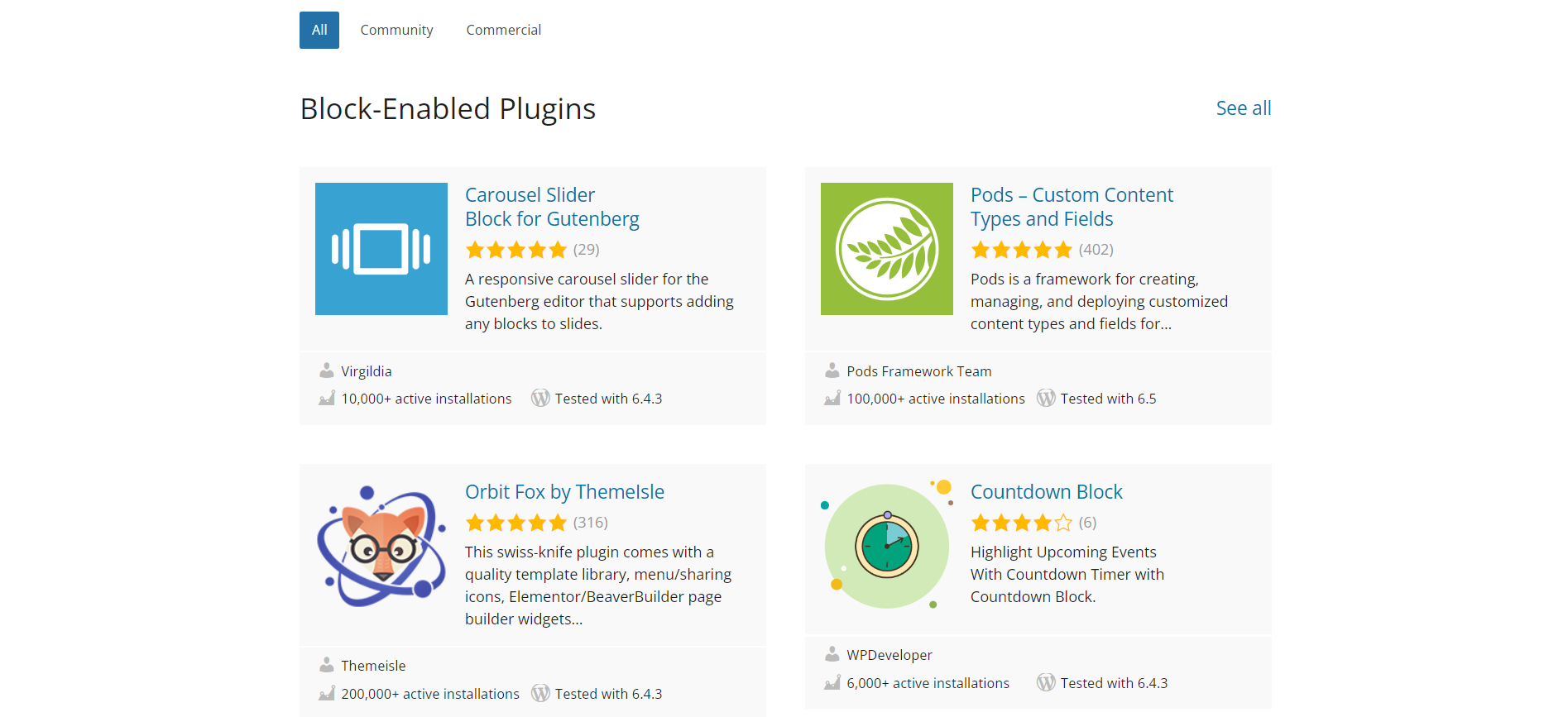
Marketing Features
Design FunctionalitiesRepresents how well each platform allows for creative design and customization of websites.Score Components:
- Template Variety (30%): Range and quality of design templates.
- Customization (30%): Flexibility and options for design alterations.
- User Interface (20%): Ease and intuitiveness of the design process.
- Responsiveness (10%): Adaptability to different devices and screen sizes.
- Innovation (10%): Unique design features and tools.
 8.1
8.1
 8.0
8.0
🏆
Overall Winner: Squarespace
. Squarespace stands out for its more advanced marketing tools, especially in SEO, email marketing, and analytics. Dreamhost relies heavily on third-party plugins for its marketing features.

|

|
|
|---|---|---|
|
SEO Tools |
|
|
|
Email Marketing |
|
|
|
Blogging |
|
|
|
Social Media Integration |
Direct linking and selling on social platforms, plus feed displays on-site |
Yes, through third-party plugins |
|
Analytics and Reporting |
Detailed insights into website performance and visitor behavior |
Yes, through Google Analytics integration |
|
Ads and Promotions |
Integration with Google Ads and tools for managing sophisticated ad campaigns |
Yes, through third-party plugins |
Customer Support
Customer supportEvaluates the quality and availability of support options.Score Components:
- Response time (40%): Speed of support responses.
- Support quality (30%): Effectiveness and helpfulness of the support.
- Availability (20%): Range of support channels (phone, chat, email).
- Resource richness (10%): Quality of self-help and educational materials.
 7.8
7.8
 7.5
7.5
🏆 Winner: Squarespace
. Squarespace edges out Dreamhost in this category with a customer support score of 7.8 compared to Dreamhost’s 7.5. Squarespace provides various customer support options, including live chat, email, a community forum, and a comprehensive help center. Live chat and phone support operate on weekdays from 6 AM to 6 PM PST, while email support is available 24/7. The community forum and help center offer 24/7 access, and language support is provided in several languages across different support channels.
DreamHost offers a variety of customer support options for its website builder, including 24/7 live chat and email support, designed to provide quick and efficient assistance. They aim for minimal wait times on live chat and strive to respond to emails within one to two hours. Additionally, phone support callbacks are available, though their availability may depend on the user’s specific plan.
When it comes to enterprise support, Squarespace extends support to enterprises through its dedicated Squarespace Enterprise plan, offering tailored features and assistance. This includes a personal account manager, priority support with extended hours, strategic guidance, and advanced security measures like single sign-on (SSO) and detailed user permissions. Dreamhost, on the other hand, does not offer support for enterprises.
Security
SecurityLooks at the platforms’ security measures and data protection.Score Components:
- Data protection (40%): Safeguards for user and customer data.
- SSL and encryption (30%): Implementation of secure connections.
- Compliance (20%): Adherence to industry security standards.
- Regular updates (10%): Frequency of security updates and patches.
 8.8
8.8
 8.2
8.2
🏆
Winner: Squarespace
. Squarespace’s security measures are comprehensive and robust, offering secure server storage, encryption, strict access controls, and compliance with regulations such as GDPR and CCPA. It also has vulnerability scanning and malware detection. For website security, Squarespace uses built-in features, including secure hosting, SSL certificates, vulnerability scanning, malware and spam filters, two-factor authentication, data encryption, and compliance with security regulations like PCI-DSS and GDPR.
Although Dreamhost also prioritizes data privacy and security, it has experienced breaches in the past. It provides comprehensive security measures for hosted websites, including free Let’s Encrypt SSL certificates, domain privacy, multi-factor authentication, anti-spam filters, daily backups, and DDoS protection. It also offers advanced security features such as DreamShield for malware removal and mod_security and lua-resty-waf as web application firewalls. Despite robust security protocols, the past breaches highlight the importance of continuous vigilance and the implementation of personal security practices alongside provider measures.
AI Capabilities
AI capabilitiesMeasures the effectiveness of AI-driven features and tools.Score Components:
- Automation efficiency (40%): Impact of AI on streamlining processes.
- Personalization (30%): AI-driven customization for users or customers.
- AI-Assisted design (20%): Role of AI in website design and functionality.
- Data analysis (10%): Use of AI in interpreting user data and analytics.
 7.5
7.5
 1.2
1.2

|

|
|
|---|---|---|
|
AI Builder |
No fully automated AI website builder |
No AI website builder |
|
AI Ecommerce features |
AI-powered copywriting, SEO optimization, related product recommendations |
No AI powered ecommerce features |
|
AI Content Generation |
Generates diverse content including product descriptions, website copy, blog posts, social media captions, and email marketing content |
AI business name generator |
|
Additional AI features |
SEO optimization suggestions, email marketing insights, inventory management insights, social media content and ad suggestions |
No additional AI features |
🏆 Winner: Squarespace
. Squarespace, with a score of 7.5, offers a variety of AI-powered features that assist in website creation, ecommerce, content generation, and other additional features. These tools contribute to a more efficient and effective website building and ecommerce platform.

Dreamhost, with a score of 1.2, has very limited AI capabilities. The only AI feature mentioned is an AI business name generator.
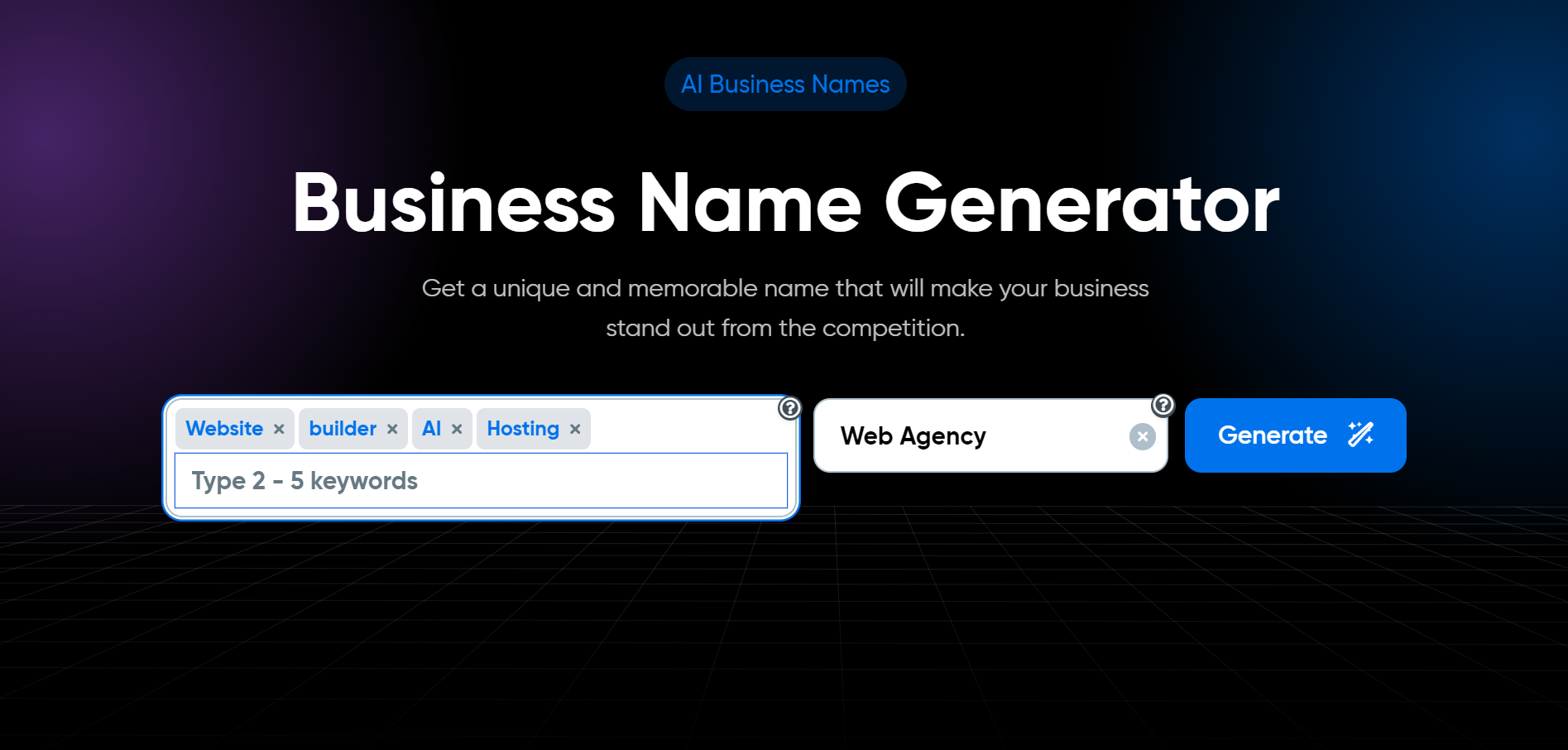
User Management
User ManagementAssesses the platforms’ capabilities in managing user roles, permissions, and accessibility.Score Components:
- Role Customization (40%): Flexibility in creating and defining user roles and
permissions. - Ease of Management (30%): User interface and tools for managing users.
- Access Control (20%): Effectiveness of access control measures for different user
levels. - Scalability (10%): Ability to manage a growing number of users efficiently.
 7.4
7.4
 8.8
8.8
🏆 Winner: Dreamhost
. Both Squarespace and Dreamhost offer user management features, but Dreamhost’s user management score is higher.
- Squarespace allows different numbers of users with editing access depending on the plan. The Personal Plan allows one owner, Business and Commerce Plans permit 2 collaborators with different access levels, and the Enterprise Plan offers unlimited users, each with customizable access privileges.
- Dreamhost, which primarily uses WordPress, allows for multiple users to edit a website. WordPress enables the addition of numerous users with various roles such as Administrator, Editor, Author, Contributor, and Subscriber. Each role has its own set of permissions and capabilities, allowing for flexible and controlled access for different users.
Squarespace User Roles and Access Levels:
| Role | Description | Access Highlights |
|---|---|---|
| Owner | The primary user who created the website and has full access. | Full site access, including billing, site settings, content editing, and member management. |
| Administrator | Users granted nearly full access to manage the site alongside the Owner. | Access to most areas except for some owner-specific settings like ownership transfer. |
| Content Editor | Users focused on adding and managing site content without full site access. | Can add, edit, and delete content on pages, blog posts, and manage comments. |
| Billing | Users who manage the subscription and billing details. | Access to billing information and the ability to update subscription details. |
| Store Manager | Users who manage the ecommerce aspects of the site. | Can manage inventory, fulfill orders, manage customers, and view sales analytics. |
| Custom | A role defined by the site owner or administrators with specific access. | Customizable access as defined by the Owner or Administrators, can vary widely between sites. |
Dreamhost User Roles and Access Levels:
| Role | Description | Access Highlights |
|---|---|---|
| Administrator | Users with full access to all administration features, including Elementor settings. | Can edit all content, Access to Elementor settings, Can install plugins and themes, Can manage users |
| Editor | Users who can manage and publish content including pages and posts. | Can edit pages/posts created with Elementor, Cannot access Elementor settings, Can manage categories, tags, and links, Can moderate comments |
| Author | Users who can publish and manage their own posts. | Can create posts with Elementor, Cannot edit pages, Limited access to media library, Cannot access Elementor settings |
| Contributor | Users who can write and manage their own posts but cannot publish them. | Can create content with Elementor, Cannot publish or edit pages, No access to Elementor settings, Submissions require review by higher-level roles |
Additional Features

|

|
|
|---|---|---|
|
SSL Certificate |
|
|
|
Custom Domain |
|
|
|
Free Custom Domain Included |
|
|
|
International Domains |
|
|
|
Mobile Responsive |
|
|
|
Page Speed |
|
|
|
Website Builder Mobile App |
|
|
|
Convert a Website To An App |
|
|
|
Website Analytics |
|
|
|
Multilingual Sites |
|
|
|
Multiple Users |
|
|
User Feedback
Squarespace is well-liked for its easy-to-use interface and versatile tools, making it ideal for those who aren’t tech-savvy. It offers various features like website creation, SEO, online selling, and more, catering to different users. Customers appreciate its good customer support and visually appealing templates, creating a professional online presence. However, some users find issues with domain transfer/setup, limited customization options, and consider the pricing slightly higher. There are also occasional concerns about customer service and technical limitations like template rigidity and missing features.
Users appreciate DreamHost WP Website Builder for its ease of use, broad template selection, and integrated hosting solutions, highlighting its utility in building and managing websites efficiently. However, some users suggest improvements in areas such as image editing capabilities, customer support, and software optimization to enhance speed and functionality. While many find it a cost-effective and user-friendly option for website development without coding, others express concerns over occasional software bugs, slow website performance, and the desire for more advanced features.
The making of this blog
We followed a clear, step-by-step process to write and research this article.
FAQ
Which platform is better for beginners, Squarespace or Dreamhost?
Can I use both Squarespace and Dreamhost for ecommerce?
How do Squarespace and Dreamhost compare in terms of design and templates?
What are the major differences in pricing between Squarespace and Dreamhost?
Which platform offers better customer support, Squarespace or Dreamhost?










